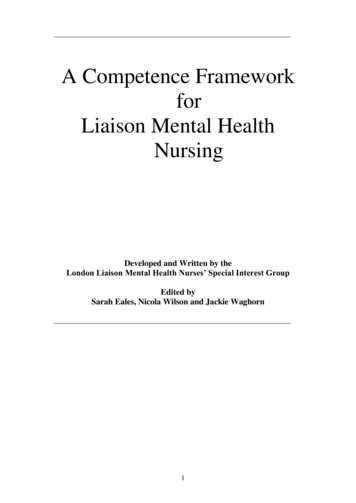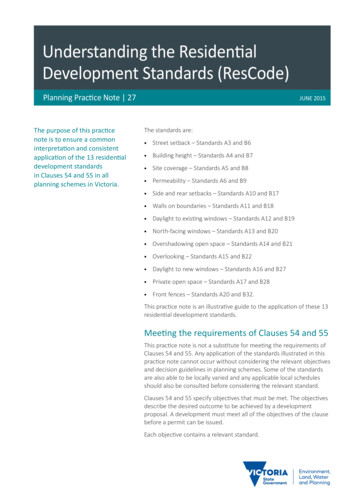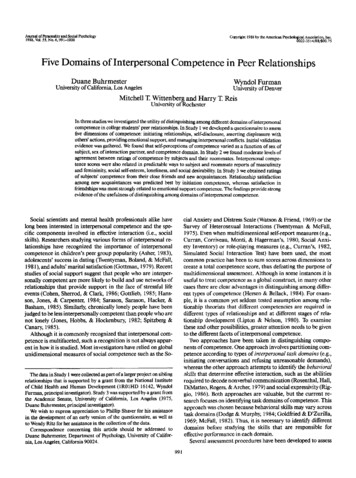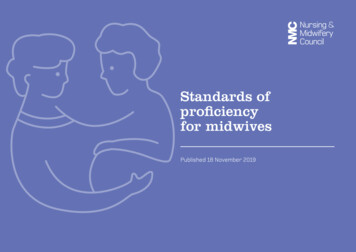
Transcription
Standards forcompetence forregistered nurses
Standards for competence for registered nursesThe Nursing and Midwifery Council (NMC) is the nursing and midwiferyregulator for England, Wales, Scotland and Northern Ireland. We exist toprotect the public. We achieve this by: maintaining a register of nurses, midwives and nursing associatessetting standards for education, training and conduct;ensuring that registered nurses, midwives and nursing associateskeep their skills and knowledge up to date; andhaving clear and transparent processes to investigate nurses,midwives and nursing associates who fall short of our standardsor breach their professional code.
Standards for competence for registered nursesIntroductionWe publish the Standards for pre-registration nurse education (NMC, 2010) which includesstandards for competence that clearly state what nurses must achieve before being registeredwith us. This is achieved by undertaking an NMC-approved three-year degree programme whichincludes learning taking place equally in the university and practice-placement settings.In the UK, nurses study a specific field of practice as part of their nursing degree and each fieldhas a specific type of registration with us. There are four fields of nursing: adult nursing children’s nursing learning disabilities nursing mental health nursing.Although these are different fields of nursing, registered nurses will be expected to meet theessential mental and physical health needs of people of all ages and conditions including thoseneeding end-of-life care. Some nurses qualify in multiple fields and so will be registered with us inmore than one field.Nurses must maintain these standards for competence throughout their careers to remainon our register. Nurses must also practise in line with the most recent version of The Code:Professional standards of practice and behaviour for nurses, midwives and nursing associates.Failing to consistently meet our standards can result in us investigating a nurse, midwife ornursing associate's fitness to practise and whether they are suitable to remain on our register.We are now making the standards for competence its own document. We are doing this to makethese standards more accessible to the public and nurses to make it clear that these are thestandards that nurses must meet when they qualify. This will also reinforce that all nurses mustmaintain these standards by keeping their knowledge and skills up to date as long as they are onour register.This is to respond to calls made by the More Care, Less Pathway report into the workings of theLiverpool Care Pathway (Department of Health, 2013). This report called for information aboutthe standards that patients and the public should expect from nurses in areas such as end-oflife care, hydration and nutrition to be published as its own document.Publishing this document also meets our commitments in response to the Francis report(Department of Health, 2012) and other recent reports on a range of healthcare issues thatfocused on patient safety and improving communication with patients and the public. It alsocomes as a result of ongoing contact with our key stakeholders representing patients andthe public across the four countries to improve access to information on the standards forcompetence expected of nurses.It is important to note that the standards for competence have not changed and remain exactlythe same as those outlined in Standards for pre-registration nursing education(NMC, 2010).
Standards for competence for registered nursesAbout the Standards for competenceThe standards for competence apply to all fields of nursing and are set out in four main areas ofprofessional nursing practice. These are: professional values; communication and interpersonal skills; nursing practice and decision making; and leadership, management and team working.Within these four areas there are two main aspects to the standards. All nurses mustdemonstrate their knowledge and competence in both in order to register as a nurse. Theseaspects are: the competencies that all nurses across all fields must know and demonstrate; and the specific competencies of each field that an individual nurse is registered in.The combination of both aspects across all four areas is in place to ensure that patients and thepublic can be confident that all registered nurses will: deliver high quality essential care to all persons in their care; deliver complex care to service users in their field of practice; act to protect the public, and be responsible and accountable for safe, person-centred,evidence-based nursing practice; act with professionalism and integrity, and work within agreed professional, ethical andlegal frameworks and processes to maintain and improve standards; practise in a compassionate, respectful way, maintaining dignity and wellbeing andcommunicating effectively; act on their understanding of how people’s lifestyles, environments and where care isdelivered influence their health and wellbeing; seek out every opportunity to promote health and prevent illness; work in partnership with other health and social care professionals and agencies, serviceusers, carers and families ensuring that decisions about care are shared; and use leadership skills to supervise and manage others and contribute to planning,designing, delivering and improving future services.
Standards for competence for registered nursesThe diagram below shows how this all fits together.The rest of this document will explain: the standards for competence which all registered nurses must meet in theirprofessional nursing practice; and the standards for competence which registered nurses in adult, child, learning disability,and mental health fields of nursing must meet.
Standards for competence for registered nursesStandards for competence that apply to allfields of nursingAll nurses in all four fields of nursing must demonstrate competencies across the four areas;professional values, communication and interpersonal skills, nursing practice and decisionmaking and leadership, management and team working. All areas (known formally as domains) areexplained fully for clarity.Professional valuesAll nurses must act first and foremost to care for and safeguard the public. They must practiseautonomously and be responsible and accountable for safe, compassionate, person-centred,evidence-based nursing that respects and maintains dignity and human rights. They mustshow professionalism and integrity and work within recognised professional, ethical and legalframeworks. They must work in partnership with other health and social care professionals andagencies, service users, their carers and families in all settings, including the community, ensuringthat decisions about care are shared.Professional values competencies that all nurses will demonstrateAll nurses must: practise with confidence according to The Code: Professional standards of practice andbehaviour for nurses, midwives and nursing associates, and within other recognisedethical and legal frameworks. They must be able to recognise and address ethicalchallenges relating to people’s choices and decision-making about their care, and actwithin the law to help them and their families and carers find acceptable solutions. practise in a holistic, non-judgmental, caring and sensitive manner that avoidsassumptions, supports social inclusion; recognises and respects individual choice; andacknowledges diversity. Where necessary, they must challenge inequality, discriminationand exclusion from access to care. support and promote the health, wellbeing, rights and dignity of people, groups,communities and populations. These include people whose lives are affected by ill health,disability, inability to engage, ageing or death. Nurses must act on their understanding ofhow these conditions influence public health. work in partnership with service users, carers, groups, communities and organisations.They must manage risk, and promote health and wellbeing while aiming to empowerchoices that promote self-care and safety. fully understand the nurse’s various roles, responsibilities and functions, and adapt theirpractice to meet the changing needs of people, groups, communities and populations. understand the roles and responsibilities of other health and social care professionals,and seek to work with them collaboratively for the benefit of all who need care. be responsible and accountable for keeping their knowledge and skills up to date throughcontinuing professional development. They must aim to improve their performance andenhance the safety and quality of care through evaluation, supervision and appraisal. practise independently, recognising the limits of their competence and knowledge. Theymust reflect on these limits and seek advice from, or refer to, other professionals wherenecessary. appreciate the value of evidence in practice, be able to understand and appraiseresearch, apply relevant theory and research findings to their work, and identify areas forfurther investigation.Standards for competence that apply to all fields of nursing
Standards for competence for registered nursesLeadership, management and team workingLeadership, management and team working competencies that all nurses willdemonstrateAll nurses must be professionally accountable and use clinical governance processes to maintainand improve nursing practice and standards of healthcare. They must be able to respondautonomously and confidently to planned and uncertain situations, managing themselves andothers effectively. They must create and maximise opportunities to improve services. They mustalso demonstrate the potential to develop further management and leadership skills during theirperiod of preceptorship and beyond.All nurses must: act as change agents and provide leadership through quality improvement and servicedevelopment to enhance people’s wellbeing and experiences of healthcare. systematically evaluate care and ensure that they and others use the findings to helpimprove people’s experience and care outcomes and to shape future services. be able to identify priorities and manage time and resources effectively to ensure thequality of care is maintained or enhanced. be self-aware and recognise how their own values, principles and assumptions may affecttheir practice. They must maintain their own personal and professional development,learning from experience, through supervision, feedback, reflection and evaluation. facilitate nursing students and others to develop their competence, using a range ofprofessional and personal development skills. work independently as well as in teams. They must be able to take the lead in coordinating,delegating and supervising care safely, managing risk and remaining accountable for thecare given. work effectively across professional and agency boundaries, actively involving andrespecting others’ contributions to integrated person-centred care. They must knowwhen and how to communicate with and refer to other professionals and agencies inorder to respect the choices of service users and others, promoting shared decisionmaking, to deliver positive outcomes and to coordinate smooth, effective transition withinand between services and agencies.Nursing practice and decision makingAll nurses must practise autonomously, compassionately, skilfully and safely, and must maintaindignity and promote health and wellbeing. They must assess and meet the full range of essentialphysical and mental health needs of people of all ages who come into their care. Where necessarythey must be able to provide safe and effective immediate care to all people prior to accessingor referring to specialist services irrespective of their field of practice. All nurses must alsomeet more complex and coexisting needs for people in their own nursing field of practice, in anysetting including hospital, community and at home. All practice should be informed by the bestavailable evidence and comply with local and national guidelines. Decision-making must be sharedwith service users, carers, families and informed by critical analysis of a full range of possibleinterventions, including the use of up-to-date technology. All nurses must also understand howbehaviour, culture, socioeconomic and other factors, in the care environment and its location, canaffect health, illness, health outcomes and public health priorities and take this into account inplanning and delivering care.Standards for competence that apply to all fields of nursing
Standards for competence for registered nursesNursing practice and decision making competencies that all nurses will demonstrateAll nurses must: use up-to-date knowledge and evidence to assess, plan, deliver and evaluate care,communicate findings, influence change and promote health and best practice. Theymust make person-centred, evidence-based judgments and decisions, in partnershipwith others involved in the care process, to ensure high quality care. They must be ableto recognise when the complexity of clinical decisions requires specialist knowledge andexpertise, and consult or refer accordingly. possess a broad knowledge of the structure and functions of the human body, and otherrelevant knowledge from the life, behavioural and social sciences as applied to health, illhealth, disability, ageing and death. They must have an in-depth knowledge of commonphysical and mental health problems and treatments in their own field of practice,including co-morbidity and physiological and psychological vulnerability. carry out comprehensive, systematic nursing assessments that take account of relevantphysical, social, cultural, psychological, spiritual, genetic and environmental factors,in partnership with service users and others through interaction, observation andmeasurement. ascertain and respond to the physical, social and psychological needs of people, groupsand communities. They must then plan, deliver and evaluate safe, competent, personcentred care in partnership with them, paying special attention to changing health needsduring different life stages, including progressive illness and death, loss and bereavement. understand public health principles, priorities and practice in order to recognise andrespond to the major causes and social determinants of health, illness and healthinequalities. They must use a range of information and data to assess the needs ofpeople, groups, communities and populations, and work to improve health, wellbeing andexperiences of healthcare; secure equal access to health screening, health promotion andhealthcare; and promote social inclusion. practise safely by being aware of the correct use, limitations and hazards of commoninterventions, including nursing activities, treatments, and the use of medical devices andequipment. The nurse must be able to evaluate their use, report any concerns promptlythrough appropriate channels and modify care where necessary to maintain safety. Theymust contribute to the collection of local and national data and formulation of policy onrisks, hazards and adverse outcomes. be able to recognise and interpret signs of normal and deteriorating mental and physicalhealth and respond promptly to maintain or improve the health and comfort of theservice user, acting to keep them and others safe. provide educational support, facilitation skills and therapeutic nursing interventions tooptimise health and wellbeing. They must promote selfcare and management wheneverpossible, helping people to make choices about their healthcare needs, involving familiesand carers where appropriate, to maximise their ability to care for themselves. be able to recognise when a person is at risk and in need of extra support and protectionand take reasonable steps to protect them from abuse. evaluate their care to improve clinical decision-making, quality and outcomes, using arange of methods, amending the plan of care, where necessary, and communicatingchanges to others.Standards for competence that apply to all fields of nursing
Standards for competence for registered nursesCommunication and interpersonal skillsAll nurses must use excellent communication and interpersonal skills. Their communications mustalways be safe, effective, compassionate and respectful. They must communicate effectivelyusing a wide range of strategies and interventions including the effective use of communicationtechnologies. Where people have a disability, nurses must be able to work with service usersand others to obtain the information needed to make reasonable adjustments that promoteoptimum health and enable equal access to services,Communication and interpersonal skills competencies that all nurses will demonstrateAll nurses must: build partnerships and therapeutic relationships through safe, effective and nondiscriminatory communication. They must take account of individual differences,capabilities and needs. use a range of communication skills and technologies to support person-centred careand enhance quality and safety. They must ensure people receive all the informationthey need in a language and manner that allows them to make informed choices andshare decision making. They must recognise when language interpretation or othercommunication support is needed and know how to obtain it. use the full range of communication methods, including verbal, non-verbal and written,to acquire, interpret and record their knowledge and understanding of people’s needs.They must be aware of their own values and beliefs and the impact this may have on theircommunication with others. They must take account of the many different ways in whichpeople communicate and how these may be influenced by ill health, disability and otherfactors, and be able to recognise and respond effectively when a person finds it hard tocommunicate. recognise when people are anxious or in distress and respond effectively, usingtherapeutic principles, to promote their wellbeing, manage personal safety and resolveconflict. They must use effective communication strategies and negotiation techniquesto achieve best outcomes, respecting the dignity and human rights of all concerned.They must know when to consult a third party and how to make referrals for advocacy,mediation or arbitration. use therapeutic principles to engage, maintain and, where appropriate, disengage fromprofessional caring relationships, and must always respect professional boundaries. take every opportunity to encourage health-promoting behaviour through education, rolemodelling and effective communication. maintain accurate, clear and complete records, including the use of electronic formats,using appropriate and plain language. respect individual rights to confidentiality and keep information secure and confidential inaccordance with the law and relevant ethical and regulatory frameworks, taking accountof local protocols. They must also actively share personal information with others whenthe interests of safety and protection override the need for confidentiality.Standards for competence that apply to all fields of nursing
Standards for competence for registered nursesStandards for competence that apply tospecific fields of nursing: AdultProfessional values competencies that adult nurses will demonstrateAdult nurses must also be able at all times to promote the rights, choices and wishes of alladults and, where appropriate, children and young people, paying particular attention to equality,diversity and the needs of an ageing population. They must be able to work in partnership toaddress people’s needs in all healthcare settings.Adult nurses must also: understand and apply current legislation to all service users, paying special attentionto the protection of vulnerable people, including those with complex needs arising fromageing, cognitive impairment, long-term conditions and those approaching the end of life.Communication and interpersonal skills competencies that adult nurses willdemonstrateAdult nurses must demonstrate the ability to listen with empathy. They must be able to respondwarmly and positively to people of all ages who may be anxious, distressed, or facing problemswith their health and wellbeing.Adult nurses must also: promote the concept, knowledge and practice of self-care with people with acute andlong-term conditions, using a range of communication skills and strategies.Nursing practice and decision-making competencies that adult nurses willdemonstrateAdult nurses must be able to carry out accurate assessment of people of all ages usingappropriate diagnostic and decision-making skills. They must be able to provide effectivecare for service users and others in all settings. They must have in-depth understanding ofand competence in medical and surgical nursing to respond to adults’ full range of health anddependency needs. They must be able to deliver care to meet essential and complex physical andmental health needs.Adult nurses must also: be able to recognise and respond to the needs of all people who come into their careincluding babies, children and young people, pregnant and postnatal women, people withmental health problems, people with physical disabilities, people with learning disabilities,older people, and people with long term problems such as cognitive impairment. safely use a range of diagnostic skills, employing appropriate technology, to assess theneeds of service users. safely use invasive and non-invasive procedures, medical devices, and currenttechnological and pharmacological interventions, where relevant, in medical and surgicalnursing practice, providing information and taking account of individual needs andpreferences. recognise and respond to the changing needs of adults, families and carers duringterminal illness. They must be aware of how treatment goals and service users’ choicesmay change at different stages of progressive illness, loss and bereavement.Standards for competence that apply to specific fields of nursing: Adult
Standards for competence for registered nurses recognise the early signs of illness in people of all ages. They must make accurateassessments and start appropriate and timely management of those who are acutely ill,at risk of clinical deterioration, or require emergency care. understand the normal physiological and psychological processes of pregnancy andchildbirth. They must work with the midwife and other professionals and agencies toprovide basic nursing care to pregnant women and families during pregnancy and afterchildbirth. They must be able to respond safely and effectively in an emergency tosafeguard the health of mother and baby. work in partnership with people who have long-term conditions that require medicalor surgical nursing, and their families and carers, to provide therapeutic nursinginterventions, optimise health and wellbeing, facilitate choice and maximise self-care andself-management.Leadership, management and team competencies that adult nurses will demonstrateAdult nurses must be able to provide leadership in managing adult nursing care, understand andcoordinate interprofessional care when needed, and liaise with specialist teams. They must beadaptable and flexible, and able to take the lead in responding to the needs of people of all agesin a variety of circumstances, including situations where immediate or urgent care is needed.They must recognise their leadership role in disaster management, major incidents and publichealth emergencies, and respond appropriately according to their levels of competence.Standards for competence that apply to specific fields of nursing: Adult
Standards for competence for registered nursesStandards for competence that apply tospecific fields of nursing: Children’sProfessional values competencies that children’s nurses will demonstrateChildren’s nurses must understand their role as an advocate for children, young people and theirfamilies, and work in partnership with them. They must deliver child and family-centred care;empower children and young people to express their views and preferences; and maintain andrecognise their rights and best interests.Children’s nurses must also: understand the laws relating to child and parental consent, including giving and refusingconsent, withdrawal of treatment and legal capacity. recognise that all children and young people have the right to be safe, enjoy life and reachtheir potential. They must practise in a way that recognises, respects and responds tothe individuality of every child and young person. act as advocates for the right of all children and young people to lead full andindependent lives. work in partnership with children, young people and their families to negotiate, plan anddeliver child and family-centred care, education and support. They must recognise theparent’s or carer’s primary role in achieving and maintaining the child’s or young person’shealth and wellbeing, and offer advice and support on parenting in health and illness.Communication and interpersonal skills competencies that children’s nurses willdemonstrateChildren’s nurses take account of each child and young person’s individuality, including their stageof development, ability to understand, culture, learning or communication difficulties and healthstatus. They will be able to communicate effectively with them and parents and carers.Children’s nurses must also: work with the child, young person and others to ensure that they are actively involvedin decision-making, in order to maintain their independence and take account of theirongoing intellectual, physical and emotional needs. understand all aspects of development from infancy to young adulthood, and identify eachchild or young person’s developmental stage, in order to communicate effectively withthem. They must use play, distraction and communication tools appropriate to the child’s or young person’s stage of development, including for those with sensory orcognitive impairment. ensure that, where possible, children and young people understand their healthcare needsand can make or contribute to informed choices about all aspects of their care.Standards for competence that apply to specific fields of nursing: Children’s
Standards for competence for registered nursesNursing practice and decision-making competencies that children’s nurses willdemonstrateChildren’s nurses are able to care safely and effectively for children and young people in allsettings, and safeguard them. Children’s nurses will be able to deliver care to meet essentialand complex physical and mental health needs informed by deep understanding of biological,psychological and social factors throughout infancy, childhood and adolescence.Children’s nurses must also: be able to recognise and respond to the essential needs of all people who come into theircare including babies, pregnant and postnatal women, adults, people with mental healthproblems, people with physical disabilities, people with learning disabilities, and people withlong term problems such as cognitive impairment. use recognised, evidence-based, child-centred frameworks to assess, plan, implement,evaluate and record care, and to underpin clinical judgments and decision-making. Careplanning and delivery must be informed by knowledge of pharmacology, anatomy andphysiology, pathology, psychology and sociology, from infancy to young adulthood. carry out comprehensive nursing assessments of children and young people, recognisingthe particular vulnerability of infants and young children to rapid physiologicaldeterioration. include health promotion, and illness and injury prevention, in their nursing practice. Theymust promote early intervention to address the links between early life adversity andadult ill health, and the risks to the current and future physical, mental, emotional andsexual health of children and young people. have numeracy skills for medicines management, assessment, measuring, monitoring andrecording which recognise the particular vulnerability of infants and young children inrelation accurate medicines calculation. use negotiation skills to ensure the best interests of children and young people in alldecisions, including the continuation or withdrawal of care. Negotiation must include thechild or young person, their family and members of the multidisciplinary and interagencyteam where appropriate. understand their central role in preventing maltreatment, and safeguarding children andyoung people. They must work closely with relevant agencies and professionals, and knowwhen and how to identify and refer those at risk or experiencing harm.Leadership, management and team competencies that children’s nurses willdemonstrateChildren’s nurses must listen and respond to the wishes of children and young people.They must influence the delivery of health and social care services to optimise the careof children and young people. They must work closely with other agencies and servicesto ensure seamless and well-supported transition to adult services.Children’s nurses must also: understand health and social care policies relating to the health and wellbeing of childrenand young people. They must, where possible, empower and enable children, young people,parents and carers to influence the quality of care and develop future policies andstrategies.Standards for competence that apply to specific fields of nursing: Children’s
Standards for competence for registered nurses ensure that, wherever possible, care is delivered in the child or young person’s home, or inanother environment that suits their age, needs and preferences. use effective clinical decision-making skills when managing complex and unpredictablesituations, especially where the views of children or young people and their parents andcarers differ. Th
The Nursing and Midwifery Council (NMC) is the nursing and midwifery regulator for England, Wales, Scotland and Northern Ireland. We exist to . protect the public. We achieve this by: maintaining a register of nurses, midwives and nursing associates setting standards for education, training and conduct;










